Learn how witnessing divine acts in the Bible led to life-altering revelations for key figures, sparking a journey of faith and transformation.
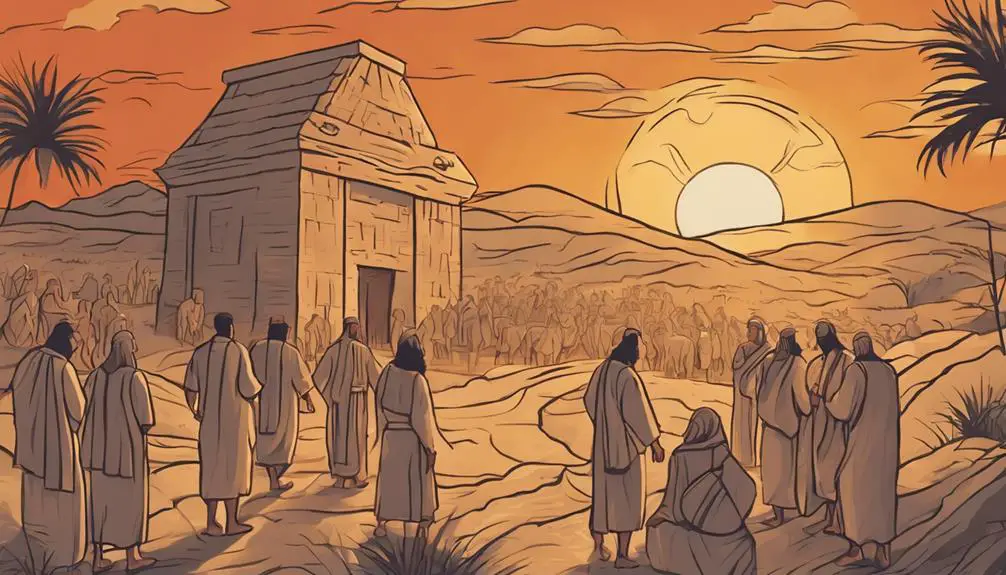
Examples of Witnessing in the Bible
Throughout biblical tales, witnessing wondrous works weaves a thread of transformative truth. You'll find that characters like Moses and the burning bush, Joshua at Jericho, and Elijah on Mount Carmel didn't just see miracles; they experienced pivotal moments that defined their faith and leadership.
These stories aren't merely historical recounts; they're lessons in courage, faith, and the power of divine intervention. By exploring these narratives, you'll uncover how each act of witnessing propelled the biblical figures towards their destiny, leaving you to ponder how moments of profound realization might be unfolding in your own life's journey.
Key Takeaways
- Divine encounters, such as Moses and the Burning Bush, powerfully redefine identity and underscore the transformative effect of witnessing God's presence.
- Faith and obedience, exemplified by Joshua at Jericho, highlight the importance of trust in God's commands over conventional wisdom or military strategy.
- The act of witnessing involves direct communication and guidance from God, as seen in Samuel's call and the Apostles at Pentecost, emphasizing readiness and humility.
- Confrontations of faith, like Elijah on Mount Carmel, serve as public testimonies of God's supremacy and call for a return to true worship and allegiance.
Moses and the Burning Bush

In the pivotal episode of Moses and the Burning Bush, we observe a transformative encounter that not only redefines Moses's identity but also sets a precedent for divine-human communication in the Judaic tradition. This divine encounter, emanating from a seemingly mundane bush ablaze yet not consumed, marks a critical juncture in the narrative arc of biblical history. Moses, initially a reluctant leader, is thrust into a role that demands both unwavering faith and faithful obedience.
Analyzing this episode, you'll notice that the divine command to remove his sandals symbolizes a transition from the profane to the sacred, underlining the gravity and sanctity of the encounter. Moses's initial hesitation and subsequent acceptance illustrate a critical theme in Judaic thought: the dialectic between human doubt and divine assurance. The burning bush episode underscores the necessity of faith in the face of the unknown and the imperative of faithful obedience to divine will.
This narrative, rich in symbolism and theological implications, emphasizes the transformative power of divine encounters. It serves as a foundational text that informs our understanding of faith, obedience, and the nature of divine communication, echoing through subsequent Judaic teachings and traditions.
Joshua and the Fall of Jericho
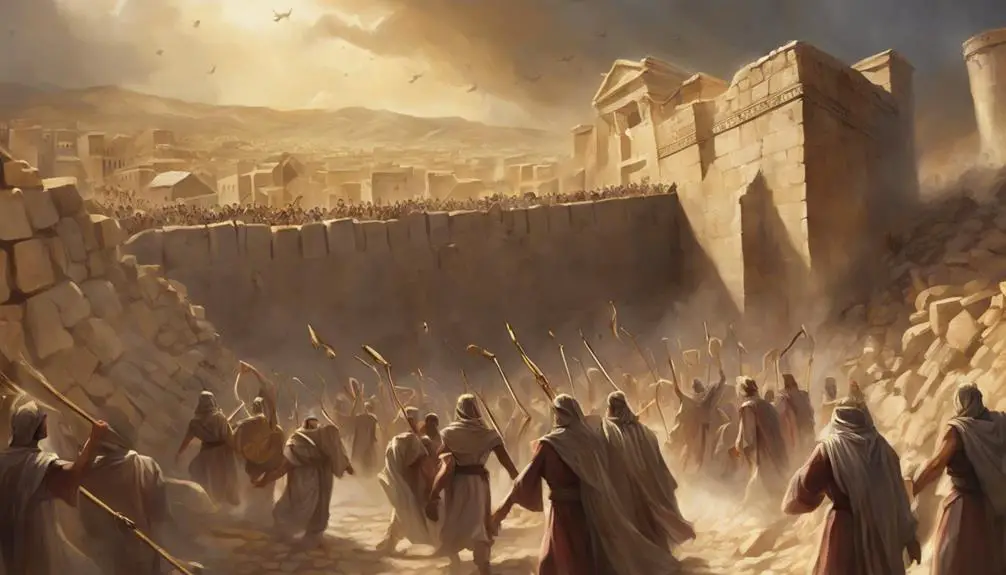
Reflecting on Moses's transformative encounter with the divine, it's crucial to explore how Joshua's leadership, particularly during the fall of Jericho, further exemplifies the intricate relationship between faith and obedience in the fulfillment of divine promises. This narrative isn't merely about military conquest but highlights a deeper spiritual warfare, where trust in God's command supersedes conventional warfare tactics.
In analyzing Joshua and the fall of Jericho, consider these compelling aspects:
- Jericho's strategies: Unlike typical sieges, the strategy for Jericho involved marching around the city walls, a directive that defied military norms yet demonstrated absolute faith in divine guidance.
- Rahab's faith: Her belief in God's power, despite her outsider status, underscores the theme of redemption and inclusion, illustrating how faith can bridge cultural and ethical divides.
- Obedience as a form of worship: The meticulous adherence to God's instructions, from the silent marches to the final shout, serves as a testament to the Israelites' devotion and trust in their divine leader.
This account challenges you to reevaluate the essence of faith, especially in contexts where logic and tradition might suggest alternative courses of action. It's a poignant reminder that witnessing God's work often requires stepping beyond the familiar, into the realm of absolute trust and obedience.
Samuel's Call in the Night
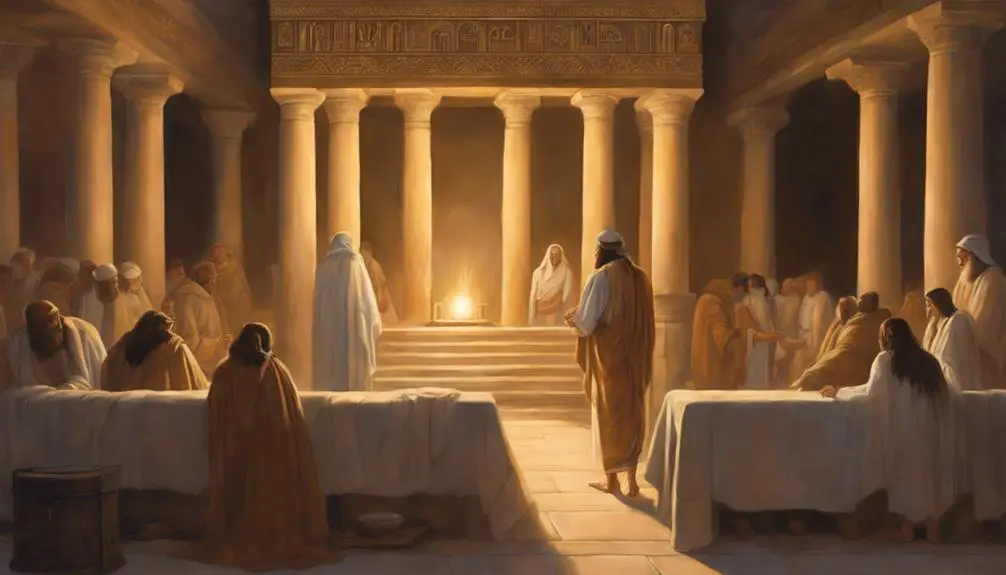
Transitioning from the grand narrative of Joshua's triumph, we now delve into the intimate moment of Samuel's call in the night, a pivotal event that underscores the personal nature of divine communication and its implications for leadership and prophetic authority in ancient Israel. This episode not only highlights the accessibility of divine messages to individuals, regardless of their status or age, but also introduces a critical examination of youthful obedience in the face of divine mandates.
Samuel's experience represents a nuanced intersection of innocence and profound responsibility. His initial inability to recognize God's voice suggests a learning curve in the divine-human relationship, emphasizing the growth necessary to fulfill one's destiny. This narrative contrasts sharply with the broader, more public demonstrations of divine power witnessed in earlier accounts, suggesting a shift towards a more personal, introspective understanding of faith and duty.
Moreover, Samuel's eventual response—'Speak, for your servant is listening'—encapsulates the essence of divine communication: a two-way exchange predicated on humility, readiness to listen, and the courage to act. This moment not only marks Samuel's transition into prophetic authority but also serves as a timeless reminder of the importance of listening for and responding to divine guidance, a principle that remains relevant across epochs.
Elijah on Mount Carmel
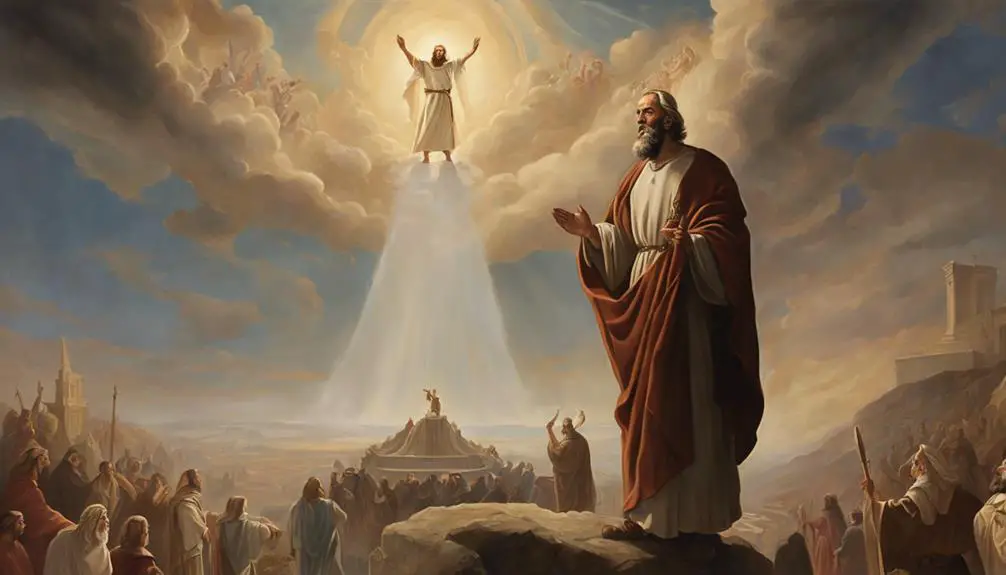
Moving from the quiet, introspective call of Samuel, we now encounter the dramatic confrontation of Elijah on Mount Carmel, showcasing a starkly different manifestation of divine power and prophetic challenge. This Carmel showdown isn't merely a spectacular display; it's a critical examination of faith, power, and divine legitimacy.
Consider these aspects:
- The context: Amidst widespread apostasy, Elijah challenges the prophets of Baal, questioning the authenticity of their gods and reaffirming the sovereignty of the Lord.
- The method: Elijah's approach is both public and confrontational, a stark contrast to more subtle forms of divine interaction. This method underscores the seriousness of Israel's departure from faithfulness.
- The outcome: The overwhelming victory of the Lord's fire consuming Elijah's sacrifice serves not just as a miraculous sign but as a turning point for Israel's spiritual journey, rekindling a recognition of the Lord's supremacy.
The Prophet's challenge on Mount Carmel serves as a pivotal moment, dissecting the heart of Israel's spiritual crisis. It's a profound demonstration of faith, a call back to allegiance, and a critical reflection on the nature of true worship.
The Apostles and Pentecost
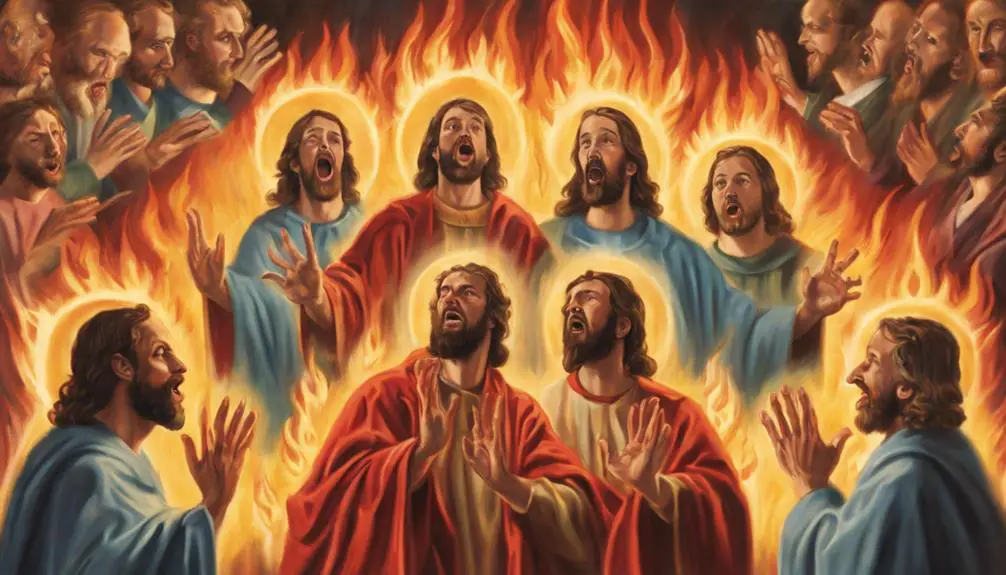
The event of Pentecost marks a seminal moment in Christian history, where the Apostles, filled with the Holy Spirit, began to speak in various tongues, underscoring the universal message and mission of the Christian faith. This profound occurrence not only demonstrates the transformative power of the Holy Spirit but also inaugurates the Apostles' public ministry, propelling the spread of Christianity beyond the confines of Judea. The Gifted Tongues, as a sign of divine empowerment, allowed the Apostles to bridge cultural and linguistic barriers, emphasizing the inclusivity of the gospel message.
Analyzing this event, it's critical to recognize the strategic significance of the Gifted Tongues in the early church's expansion. The ability to communicate in diverse languages served as a tangible confirmation of the Apostles' divine commissioning and facilitated the immediate engagement with a varied audience gathered in Jerusalem. This phenomenon, therefore, wasn't just a miraculous display but a strategic tool for evangelism, tailored for the multicultural context of the time.
Moreover, Pentecost challenges contemporary readers to reflect on the role of the Holy Spirit in witnessing and ministry. It prompts a reevaluation of how divine empowerment can transcend human limitations, fostering a more inclusive and effective outreach.
Frequently Asked Questions
How Does the Concept of Witnessing in the Bible Differ Between the Old Testament and the New Testament?
When comparing witnessing methods between the Old and New Testament, you'll notice distinct differences. In the Old Testament, witnessing often involves direct divine intervention and miraculous signs. It's more about demonstrating God's power and authority through chosen individuals.
However, in the New Testament, witnessing shifts towards personal testimonies and the spread of Jesus' teachings through discipleship. This testament comparison reveals a move from a predominantly physical demonstration to a more relational and personal approach to witnessing.
Can Witnessing in the Bible Be Considered a Form of Divine Intervention, and if So, How?
Yes, witnessing in the Bible can be seen as a form of divine intervention. When you consider the concept, it's clear that divine testimony often triggers significant intervention outcomes.
It's not just about observing; it's about an active, divine influence shaping events and guiding individuals. This interaction between the divine and the mundane exemplifies how witnessing transcends mere observation, embodying a critical, transformative role within biblical narratives.
In What Ways Has the Act of Witnessing in Biblical Times Influenced Modern Religious Practices and Evangelism?
You've seen how modern religious practices and evangelism have roots in biblical witnessing. By understanding the historical context, you recognize that these acts weren't just about spreading faith; they were deeply embedded in cultural adaptation.
This insight allows you to critically analyze how stories of divine experiences were shared and adapted over time, shaping the way faith is expressed and evangelized today. It's a testament to the enduring influence of those ancient practices.
Are There Examples of Reluctant Witnesses in the Bible Who Initially Resisted God's Call, and What Can We Learn From Them?
Yes, you'll find figures in scripture who initially resisted God's call, embodying personal transformation through reluctant acceptance. Analyzing their journeys offers deep insights.
For instance, Jonah's flight and eventual submission underscore the struggle and growth from resistance to fulfillment of divine missions. This critical examination reveals that reluctance isn't a barrier to divine purpose but a stage in developing unwavering faith and commitment, emphasizing the power of transformation in spiritual journeys.
How Do Non-Canonical Texts or Apocryphal Writings Treat the Theme of Witnessing, and Do They Offer Any Unique Perspectives Not Found in the Canonical Bible?
You're exploring how non-canonical texts approach witnessing, focusing on Gnostic perspectives and Apocalyptic imagery. These writings often present unique views not found in the canonical Bible, offering deeper, sometimes more mystical interpretations of divine encounters and prophetic visions.
They challenge traditional narratives, encouraging a more personal, introspective form of faith. Analyzing these texts can broaden your understanding of early Christian diversity and the evolution of religious thought.
Conclusion
In analyzing these biblical narratives, it's evident that witnessing acts as a transformative conduit between the divine and the mundane. Each instance, from Moses's encounter with the divine in the burning bush to the Apostles' experience at Pentecost, underscores a pivotal shift in understanding and mission.
These moments aren't merely historical footnotes but foundational elements that shape the theological and ethical framework of the faith community. Through these witnesses, the Bible articulates a dynamic interplay between human agency and divine purpose.

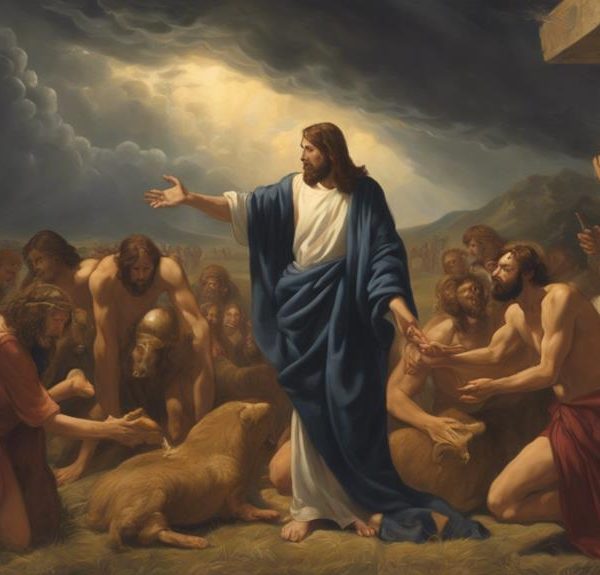

Sign up